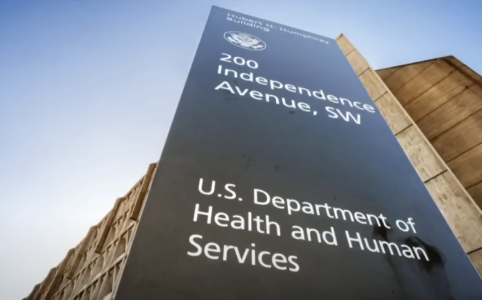All in on one shot? HHS redirects $500 million to new vaccine project—what this unusual move means
By
Veronica E.
- Replies 0
What happens when half a billion dollars in federal research funding is quietly redirected to a single vaccine project—without the usual scientific review?
That’s the question circulating after the US Department of Health and Human Services announced it would shift $500 million from COVID-19 vaccine research to a new initiative aimed at developing a universal flu shot.
With little public discussion and high stakes for public health, the move is raising questions—and eyebrows.
The project aims to develop a universal flu vaccine using a platform called beta-propiolactone (BPL)—a chemical used to inactivate viruses during vaccine production.
HHS says the initiative is intended to create a vaccine that can protect against any strain of the flu and hopes to begin clinical trials next year, with FDA approval targeted for 2029.

Emails reviewed by CBS News show that the funding decision was made without the usual review process from career scientists at the National Institutes of Health (NIH) and the Biomedical Advanced Research and Development Authority (BARDA).
The order reportedly came from Noah Miller, a political appointee and special assistant to HHS Secretary Robert F. Kennedy Jr.
According to two federal health officials, it is unusual for one official to direct such a large investment without external scientific vetting.
A spokesperson for HHS stated that “decision-making for project Generation Gold Standard was a collaborative process, between leaders of HHS,” and emphasized that the funding is meant to address “all influenza threats, not just one.”
The project is linked to Dr. Matthew Memoli, who briefly served as acting NIH director earlier this year during a transition that involved policy shifts under the Trump administration, including cuts to funding and staffing.
It is also tied to Dr. Jeffery Taubenberger, who holds a patent for the BPL platform.
He was recently named acting head of the National Institute of Allergy and Infectious Diseases (NIAID) after the previous director was removed.
Both Memoli and Taubenberger led a small Phase 1 safety study of the BPL vaccine earlier this year.
The $500 million came from Project NextGen, a $5 billion initiative started under the Biden administration to fund next-generation COVID-19 vaccines and treatments.
Before the reallocation, $62.4 million in NIH grants had been awarded to researchers at seven universities working on pan-coronavirus vaccines.
BARDA had also issued $551 million in awards to four companies conducting Phase 2B clinical trials of experimental COVID-19 vaccines.
In a statement to CBS News, HHS spokesperson Vianca Rodriguez Feliciano said the new initiative “realigns BARDA with its core mission: preparing for all flu viral pathogens, not just COVID-19.”
She also described it as “a cost-effective, accountable alternative to the Biden administration’s wasteful Project NextGen, which spent $1.63 billion on COVID-19 vaccines and $1.19 billion on therapeutics, neglecting broader pandemic preparedness.”
The department’s public release said the decision reflects a “decisive shift toward transparency, effectiveness, and comprehensive preparedness,” with a renewed focus on “in-house development” of vaccines rather than relying on external proposals.
It also stated that BPL-based vaccines may be used not only for flu but for future COVID-19 vaccines as well, describing the approach as “traditional vaccine technology brought into the 21st century.”
The transfer of $500 million to a single project makes this one of the largest BARDA awards to date, surpassing a previous $452 million grant to a company working on an oral COVID-19 vaccine.
As HHS pursues its goal of developing a universal flu vaccine, public health experts are watching closely for updates on clinical trials, safety data, and the potential impact on other federally funded vaccine research.
Read next: Doctors plead: Over 50? This is the must-have vaccine before winter!

Do you think this was the right move—or are you concerned about the process behind it? Have you or a loved one been affected by flu or other vaccine-preventable illnesses?Share your thoughts in the comments!
That’s the question circulating after the US Department of Health and Human Services announced it would shift $500 million from COVID-19 vaccine research to a new initiative aimed at developing a universal flu shot.
With little public discussion and high stakes for public health, the move is raising questions—and eyebrows.
The project aims to develop a universal flu vaccine using a platform called beta-propiolactone (BPL)—a chemical used to inactivate viruses during vaccine production.
HHS says the initiative is intended to create a vaccine that can protect against any strain of the flu and hopes to begin clinical trials next year, with FDA approval targeted for 2029.

A new federal vaccine project is drawing attention for its size, scope, and unexpected funding shift. Image Source: YouTube / NBC News.
How the decision was made
Emails reviewed by CBS News show that the funding decision was made without the usual review process from career scientists at the National Institutes of Health (NIH) and the Biomedical Advanced Research and Development Authority (BARDA).
The order reportedly came from Noah Miller, a political appointee and special assistant to HHS Secretary Robert F. Kennedy Jr.
According to two federal health officials, it is unusual for one official to direct such a large investment without external scientific vetting.
A spokesperson for HHS stated that “decision-making for project Generation Gold Standard was a collaborative process, between leaders of HHS,” and emphasized that the funding is meant to address “all influenza threats, not just one.”
Who is leading the project?
The project is linked to Dr. Matthew Memoli, who briefly served as acting NIH director earlier this year during a transition that involved policy shifts under the Trump administration, including cuts to funding and staffing.
It is also tied to Dr. Jeffery Taubenberger, who holds a patent for the BPL platform.
He was recently named acting head of the National Institute of Allergy and Infectious Diseases (NIAID) after the previous director was removed.
Both Memoli and Taubenberger led a small Phase 1 safety study of the BPL vaccine earlier this year.
Also read: Are you over 50? The CDC urges you to get this essential vaccine for your health!
How this compares to other vaccine research
The $500 million came from Project NextGen, a $5 billion initiative started under the Biden administration to fund next-generation COVID-19 vaccines and treatments.
Before the reallocation, $62.4 million in NIH grants had been awarded to researchers at seven universities working on pan-coronavirus vaccines.
BARDA had also issued $551 million in awards to four companies conducting Phase 2B clinical trials of experimental COVID-19 vaccines.
Also read: Breaking: The CDC is investigating this vaccine—are you at risk after recent hospitalizations?
HHS explains its reasoning
In a statement to CBS News, HHS spokesperson Vianca Rodriguez Feliciano said the new initiative “realigns BARDA with its core mission: preparing for all flu viral pathogens, not just COVID-19.”
She also described it as “a cost-effective, accountable alternative to the Biden administration’s wasteful Project NextGen, which spent $1.63 billion on COVID-19 vaccines and $1.19 billion on therapeutics, neglecting broader pandemic preparedness.”
The department’s public release said the decision reflects a “decisive shift toward transparency, effectiveness, and comprehensive preparedness,” with a renewed focus on “in-house development” of vaccines rather than relying on external proposals.
It also stated that BPL-based vaccines may be used not only for flu but for future COVID-19 vaccines as well, describing the approach as “traditional vaccine technology brought into the 21st century.”
The transfer of $500 million to a single project makes this one of the largest BARDA awards to date, surpassing a previous $452 million grant to a company working on an oral COVID-19 vaccine.
As HHS pursues its goal of developing a universal flu vaccine, public health experts are watching closely for updates on clinical trials, safety data, and the potential impact on other federally funded vaccine research.
Read next: Doctors plead: Over 50? This is the must-have vaccine before winter!
Key Takeaways
- HHS redirected $500 million from COVID-19 vaccine research into a single universal flu vaccine project called “Generation Gold Standard.”
- The decision bypassed the usual NIH and BARDA review processes, raising concerns among federal health officials.
- The vaccine platform, beta-propiolactone (BPL), has limited data and is still in early testing phases.
- Critics argue the move lacks transparency, while HHS says it reflects a broader push for in-house development and pandemic preparedness.
Do you think this was the right move—or are you concerned about the process behind it? Have you or a loved one been affected by flu or other vaccine-preventable illnesses?Share your thoughts in the comments!






